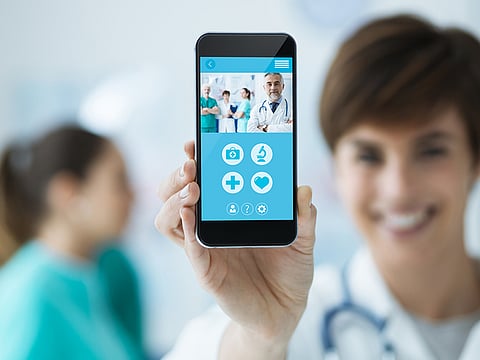Doctors for the digital age
With AI and smart apps, the accuracy, efficiency and convenience of healthcare can be significantly improved

While I’m still contemplating whether I need to buy that Apple watch or not, the digital world is moving ahead at lightning speed, making me worried that I’m going to become a dinosaur in the tsunami of all things virtual. This rapid development is also happening in the world of healthcare. The latest buzzword in digital healthcare is virtual health.
Thousands of patients in London are using the NHS-approved GP at Hand service, which is powered by Babylon, a health service provider. The service enables users to have virtual consultations with doctors and healthcare professionals via text and video calling through its mobile application.
More than 26,000 people across central London have registered for the free-at-point-of-need NHS GP at hand service since its launch in November 2017. The service also allows users to receive drug prescriptions, referrals to health specialists and book health examinations at nearby facilities. Through AI, Babylon is able to provide information on 360 diseases, 500 symptoms and 10,000 risk factors.
Arabic version
Currently, in Dubai, Babylon is discussing developing an Arabic version of this AI technology-driven app. It is one of the four firms that are taking part in DHA’s Cohort 4 set of objectives, which is part of the Dubai Future
Accelerator’s initiative.
Over the next nine weeks, Babylon will present its services to the DHA Future Accelerators team to discuss ways in which its system can be launched in Dubai.
In the previous cycles of the Dubai Future Accelerators initiative, DHA worked with 3D-printing firms and deployed the technology across its dental services. As a result, several complicated surgeries were performed using this technology and 3D-printed artificial legs were used to provide amputees with a new lease to life.
One of the amputees mentioned how her 3D-printed foot was much closer to the feeling of having an actual foot compared to the previous one she was wearing.
One additional benefit of 3D printing is the cost-effectiveness of the technology, which makes it affordable across a wide spectrum of patients who need it.
“The aim of DHA as part of the Dubai Future Accelerators initiative is to explore the latest in technology,” says Dr Mohammad Al Redha, Director of The Executive Office for Organisational Transformation in DHA.
“We aim to revolutionise the way healthcare is delivered while focusing on patient-centric care. We are looking for ways to improve the lives of patients and ensure patients lead a high quality of life to the best extent possible. Technology also has the power to improve efficiencies of the overall health sector, improve healthcare management and bring down the cost of care.”
new tech
“During this cycle we will work with companies to see how we can incorporate their technology in Dubai,” says Khulood Al Ali, Specialist at The Executive Office for Organisational Transformation in DHA. “We are working with Babylon on an Arabic version of the AI-powered app so that we can empower patients, cut down waiting times across hospitals and health centres and provide patients round-the-clock care.
“It’s important to understand the benefits of the Dubai Future Accelerators initiative. It provides us with a platform to think of ground-breaking ideas that can benefit patients and the health sector in general.”
Olly Finding, International Director at Babylon, explains the functionality of the app. “Once a user downloads this app they input their health information. AI is then used and several questions are asked. If the user opts to subscribe through NHS instead of a private subscription, all the data on the NHS file is automatically sent to the app. Thus, the app has all the patient history needed.”
In addition to access to round-the-clock GP consultations, virtual health reduces waiting times for patients.
Additionally, the app syncs with over 100 devices, including Apple and Android products, so that information about the patient’s sleep pattern, exercise routine, number of calories burned and daily activity is recorded.
Future versions of the app will also feature facial recognition with emotional analysis, so when you use it for video calling your GP it prevents you from answering health-related questions dishonestly. If you haven’t taken your medicines and you say you have, your GP will know!
High accuracy rate
Accuracy with AI is high, says Finding. “Virtual health has actually helped increase the number of GPs in London by 15-20 per cent, as GPs who go on maternity leave or those who are retired use this service to continue their practice. The GP has complete access to the patient’s records through the app and when the virtual consultation takes place, all the data is pulled up in front on the GP on the laptop screen.
“Babylon’s AI is consistently 13% more accurate than a doctor, 17% more accurate than a nurse and performed significantly faster 89% of the time during a recent triage test, which measured the AI’s performance alongside a group of UK medical practitioners."
He added that in the UK, as there is a legislation for e-prescriptions post consultation they are accepted in 90 per cent of the pharmacies and medication is delivered within one hour anywhere in London and within one day in the UK.
“One multinational company that used this service for its employees saved approximately £1 million (around Dh5.2 million) and 6,000 hours of productivity. The company also used the app to send push notifications about diet, well-being and exercise to its obese employees in a bid to motivate them to make lifestyle changes.”
Over the next nine weeks, Babylon will present its capabilities at Cohort 4 and in time, we will be able to see how Dubai creates its own niche at the forefront of virtual care.


